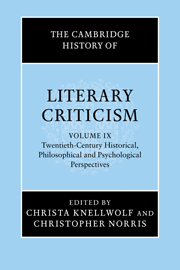Book contents
- Frontmatter
- Introduction
- HISTORY
- MARXISM AND POST-MARXISM
- FROM CULTURAL POETICS TO CULTURAL STUDIES
- PSYCHOANALYTIC APPROACHES
- 14 Literary criticism and psychoanalytic positions
- GENDER AND SEXUALITY
- COLONIALISM, POST-COLONIALITY, NATION AND RACE
- MODERNITY AND POSTMODERNISM
- PHILOSOPHY, AESTHETICS AND LITERARY CRITICISM
- INTERDISCIPLINARY APPROACHES
- Bibliography
- Index
- References
14 - Literary criticism and psychoanalytic positions
from PSYCHOANALYTIC APPROACHES
Published online by Cambridge University Press: 28 March 2008
- Frontmatter
- Introduction
- HISTORY
- MARXISM AND POST-MARXISM
- FROM CULTURAL POETICS TO CULTURAL STUDIES
- PSYCHOANALYTIC APPROACHES
- 14 Literary criticism and psychoanalytic positions
- GENDER AND SEXUALITY
- COLONIALISM, POST-COLONIALITY, NATION AND RACE
- MODERNITY AND POSTMODERNISM
- PHILOSOPHY, AESTHETICS AND LITERARY CRITICISM
- INTERDISCIPLINARY APPROACHES
- Bibliography
- Index
- References
Summary
Storytelling is the obvious link between psychoanalysis and literature. Sixty years before Jacques Lacan described the unconscious as structured like a language, its method was labelled the ‘talking cure’ by an early patient. Most psychoanalytic methods produce texts, and most use texts such as dreams, narratives, slips of the tongue, jokes, but also bodily symptoms for their investigations. Freud employs Greek myths (most prominently Oedipus and Narcissus) for his crucial concepts. Jung scrutinises fairy tales and folklore, eastern and western religion, even alchemy. Neither differentiates between stories by actual patients and those inherited by literature and culture. This trend continues into the late twentieth century, as is evident in Lacan's analysis of Edgar Allan Poe's story ‘The Purloined Letter’. Eventually, psychoanalytic texts themselves have become objects of analysis, as in the writings of Abraham and Torok, who analyse Freud's analysis of the pathological case study the ‘Wolf-Man’.
Text-based in its methods, psychoanalysis shares with literature the poiesis of images and expressions, the poetics of their arrangement, the grammar of narratives, but also a theory of interpretation. The latter frequently abandons the idea of an origin of symptoms (in empirical fact or transcendent metaphysics) and instead refers to other texts, previous traumas or archetypal images and stories that are closely related to myths. Modern literary theory calls this ‘intertextuality’. Psychoanalytic theories also refer to their material in literary terms: the poetry of dreams, the drama of ur-scenes, and the narratives that emerge from them.
- Type
- Chapter
- Information
- The Cambridge History of Literary Criticism , pp. 173 - 190Publisher: Cambridge University PressPrint publication year: 2001



